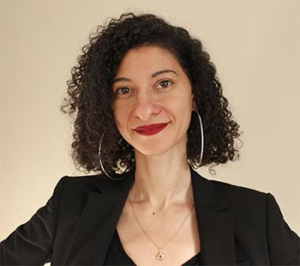
Chanda Prescod-Weinstein
The night sky belongs to all of us, said author and University of New Hampshire professor Chanda Prescod-Weinstein, but not all of us have the same access to exploring topics involving astrophysics, astronomy, and cosmology.
Prescod-Weinstein encouraged Milton students, particularly those from historically excluded identities, to pursue theoretical sciences because “when we look up at the night sky, what we are seeing is only a small fraction of what’s actually there,” and because scientists with diverse perspectives and experiences will help expand the questions posed about the universe.
The late Vera Rubin, a pioneering American astronomer who was the first to provide evidence of the presence of dark matter—the majority of the matter in the universe is dark matter, or invisible matter—faced significant sexism and isolation from her scientific contemporaries, mostly white men, said Prescod-Weinstein. Such obstacles propelled Rubin toward her groundbreaking research.
“Science as a community, as a collection of facts that we know, as the set of principles that we use to collect those facts, all of these definitions of science are key to the stories we tell about who matters and whose ideas count,” Prescod-Weinstein said, noting that Rubin’s discovery occurred more than a decade before the first Black woman received a doctorate in science. “So the science that we understand and the scientific narrative is shaped by who is allowed to be in the room at any given time.”
“Science as a community, as a collection of facts that we know, as the set of principles that we use to collect those facts, all of these definitions of science are key to the stories we tell about who matters and whose ideas count. So the science that we understand and the scientific narrative is shaped by who is allowed to be in the room at any given time.”
– Dr. Chanda Prescod-Weinstein
Despite generations of BIPOC scientists making incredible discoveries and innovations, the contributions of scientists with marginalized identities are often overlooked or attributed to others, Prescod-Weinstein said. She shared the story of an enslaved Black man renamed Onesimus, whose idea and procedure for inoculation against smallpox mitigated an early 18th-century epidemic in Boston. Onesimus’ owner, Puritan minister Cotton Mather, and physician Zabdiel Boylston are credited with using the idea for variolation, saving dozens of lives and helping to pave the way for an eventual smallpox vaccine.
“Science is part of our heritage. It is part of our history,” said Prescod-Weinstein, who is Barbadian and Jewish. “It is our task to remain curious.”
Prescod-Weinstein is an assistant professor in the Department of Physics and Astronomy and a core faculty member in Women’s Studies at the University of New Hampshire. Previously, she was a research associate in the High Energy Theory Group of the Department of Physics at the University of Washington and held a Dr. Martin Luther King Jr. postdoctoral fellowship at the Massachusetts Institute of Technology. She is the author of The Disordered Cosmos: A Journey into Dark Matter, Spacetime, and Dreams Deferred. Prescod-Weinstein is an advocate for BIPOC and LGBTQ+ scientists and is a member of several national societies and committees to expand representation in the sciences. She was this year’s Margaret A. Johnson speaker. Named for the leader of the former Milton Academy Girls’ Upper School, the Johnson endowment brings to campus women who are leaders in their fields.
Prior to Prescod-Weinstein’s talk, three Ukrainian students spoke about Ukraine and the suffering of the country’s citizens under the recent invasion and attacks by Russian forces. Stefania Bielkina ’23, Yevgeniya Regent ’24, and Maya Spektorov ’24 shared their love for Ukrainian culture and people and called for support from the Milton community.